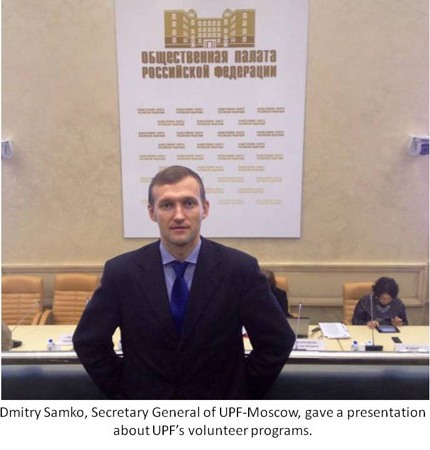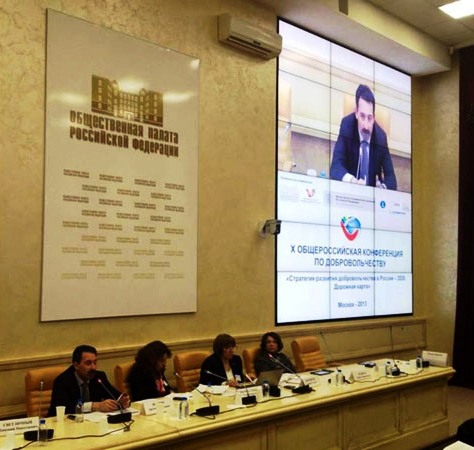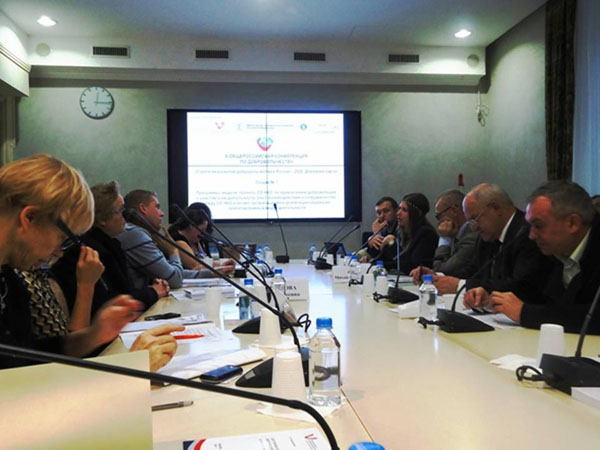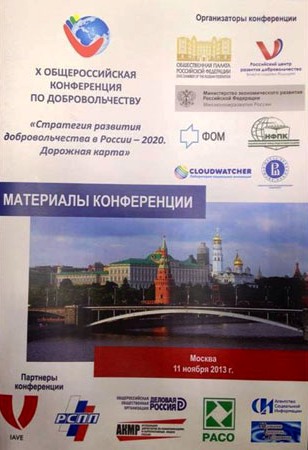![]()
The Words of the Samko Family
|
|
The Words of the Samko Family |

Moscow, Russia -- How to stimulate volunteerism was the main topic for about 200 representatives from Russian NGOs, businesses and government who met at the 10th All-Russia Conference on Volunteerism. The conference, titled "Development Strategy for Volunteerism in Russia -- 2020 Road Map," was held on Nov. 11, 2013, in the Russian Federation Civic Chamber building in Moscow.
Based on statements from the participants, it became clear that cooperation between NGOs, businesses and government is mutually beneficial.

"Corporate volunteering can benefit the community: Business companies share their knowledge and skills with nonprofit organizations," said Maria Pomogaeva, head of projects for the Victoria children's charity. "On the other hand, corporate volunteering is effective when the company is working on this issue together with NGOs. Volunteering is not a core activity of a commercial organization, and the details escape its attention."
Vladimir Khromov, director of the NGO Association of Volunteer Organizations and Movements, emphasized that development of volunteering is beneficial for regional authorities. "Often the regional authorities find it hard to obtain a partner organization whose activity scale would equal that of the region. Ideally, the NGO Association could become such a partner," he said.

"If the state would like the NGOs to do something for regional authorities, it needs to allocate resources," Mr. Khromov said. "NGOs are limited in resources. They have problems with the premises, social advertising, and access to information resources for conveying their expertise."
The participants agreed that development of volunteerism needs stimulating factors, such as inter-regional and international cooperation. However, the problem of decreasing interest in volunteerism at events of minor importance and scope was also discussed.
Dmitry Samko, secretary general of UPF-Moscow, noted that 80,000 volunteers have been recruited for the 2014 Winter Olympics, which will take place in Sochi, Russia, on the Black Sea from Feb. 7 to 23.

"The motivational factor for many volunteers [at the Olympic Games] is the event itself: They could have a good time, wear cool T-shirts, share photos in social networks, and take their photos with the [Olympic] torch. And when information diversity subsides, interest in providing volunteer assistance would gradually decrease," Mr. Samko said.
The participants suggested proposals to the draft plan of the "2020 Road Map," a strategy for developing volunteerism.
Elena Topoleva, chairwoman of the Russian Federation Civic Chamber for social policy, labor relations and quality of citizens' life, said: "It is very important to build a logical connection between young people's volunteering, university schedule and employment -- for example, if universities approved flexible attendance for student volunteers, and in addition to the diplomas would provide each graduate with a certificate listing his or her volunteer activities. It is important for young people that these activities are taken into account by employers when applying for a job."